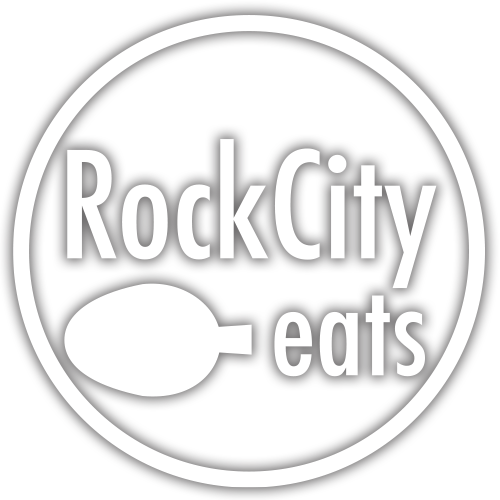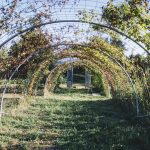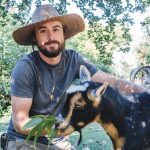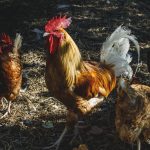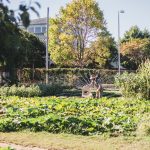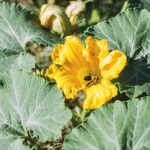Agriculture calls the city home in urban farming, a phrase that has become on-trend within the past few years. Back in 1992, however, Little Rock was already ahead of the game with the creation of the Dunbar Garden Community Project.
Located on 1800 South Chester Street, the garden was initially formed with an educational aspect in mind, especially as the space sits adjacent to two schools. Later on, the City of Little Rock entered into a partnership with the garden as well.
Some five years ago, Christopher Wyman was attracted to the space, and applied for a job there. He now spends the bulk of his time on the two acre plot, teaching the people who come through, working the land, and caring for the livestock with his counterpart Damien Thompson.
“It’s been an absolute blessing to have a job like this. I couldn’t see myself working in an office,” he says.
Wyman’s plan after college was to teach, although the Little Rock native found life taking him elsewhere – toward farming. He says, “My grandmother taught me a lot about [farming], she and my grandfather grew up with victory gardens in their backyards. Urban farming was something that they were doing back then.”
That along with his experience of working around food in restaurants would eventually lead him to Dunbar. “I started to really notice the importance of the kind of product that you’re receiving – your produce and where it’s coming from. You can see a lot of difference,” he explains.
Now, Dunbar is his second home. He describes the space as a community, but a dynamic one, as he says: “It’s a community garden in the sense that the community came come volunteer and take home whatever is ready. We want to be able to work on a bartership and have people help us to really make this what it is today.”
This bartering includes everything, even local beer. Dunbar produces hops, an ingredient integral to beer, and provides this to brewers free of cost. After the brewers produce beer, Wyman says, “We might get a portion of it that we can use for an event – that way we make more money and we promote them as well.”
As a part of the food scene, Dunbar has definitely carved a niche in the community. Wyman says, “The revitalization of the south main area has been great for us – we love having those restaurants close. They’re all into the local aspect and they all want to buy local,” says Wyman.
Like at any garden or farm, no matter the amount of planning, things change. “It’s always a learning process, you learn new things everyday. It’s a challenge, but that makes it a lot more interesting,” he laughs.
He’s thankful for his wife, the master gardener at the Governor’s Mansion, and her input into any problems he may be having. Plus, there are other urban farmers he can turn to, as well. “There’s a real close-knit group of us out here and we all collaborate, share experiences. … we teach and learn from each other,” he says.
If you’ve never ventured out to the garden, you should. Stepping through the gate is like stepping into a different world. Equipped with a greenhouse, numerous plants, flowers, veggies, fruits and the like, the garden also boasts of a wind turbine, which has called the space home for over five years.
You can’t miss the noise either – an occasional cluck or crow – from the chicken coop. Thanks to some help from Heifer International, the garden was able to establish it some years back. “Our chickens are here for the kids to see and for their egg production … we do not sell them,” explains Wyman.
Goats also call the garden home, and they’re donated from a farm out in Saline County. Wyman milks the goats daily, and gets about a half gallon. Currently, there are some rabbits as well. In the past, the garden has also boasted of guinea fowl, quail, and turkeys.
The livestock component makes for a great topic for kids – or anyone else touring the garden. On the plant side of things, Wyman likes to keep it interesting. He says, “We grow quite a bit of different stuff out here because we want the kids to see different things. They’ve come out and seen the usual things we grow – the squash, the zucchini, the cucumbers, the peppers. But we grow other stuff as well.”
Take for instance, sorghum. Dunbar grows it, although does not produce enough to press into molasses. They also grow the hottest peppers in the world, and provide them to the Root’s Pepper Eating Contest each year. Plus, the garden plays hosts to beehives, and this past year produced over 75 pounds of honey.
With the help of the greenhouse, Dunbar aims to spread the love to other urban farms and beyond. He says, “We actually can produce more plant starts in there for spring than we need, so we donate a lot of plants to other community gardens and other farms.”
You can catch all aspects of farming at Dunbar, as Wyman says, “We do a little bit of everything. This is not really a garden, in a sense, this is more of a farm.” So, plan a trip out for their next event and get outside.
Located on 1800 South Chester Street, the garden was initially formed with an educational aspect in mind, especially as the space sits adjacent to two schools. Later on, the City of Little Rock entered into a partnership with the garden as well.
Some five years ago, Christopher Wyman was attracted to the space, and applied for a job there. He now spends the bulk of his time on the two acre plot, teaching the people who come through, working the land, and caring for the livestock with his counterpart Damien Thompson.
“It’s been an absolute blessing to have a job like this. I couldn’t see myself working in an office,” he says.
Wyman’s plan after college was to teach, although the Little Rock native found life taking him elsewhere – toward farming. He says, “My grandmother taught me a lot about [farming], she and my grandfather grew up with victory gardens in their backyards. Urban farming was something that they were doing back then.”
That along with his experience of working around food in restaurants would eventually lead him to Dunbar. “I started to really notice the importance of the kind of product that you’re receiving – your produce and where it’s coming from. You can see a lot of difference,” he explains.
Now, Dunbar is his second home. He describes the space as a community, but a dynamic one, as he says: “It’s a community garden in the sense that the community came come volunteer and take home whatever is ready. We want to be able to work on a bartership and have people help us to really make this what it is today.”
This bartering includes everything, even local beer. Dunbar produces hops, an ingredient integral to beer, and provides this to brewers free of cost. After the brewers produce beer, Wyman says, “We might get a portion of it that we can use for an event – that way we make more money and we promote them as well.”
As a part of the food scene, Dunbar has definitely carved a niche in the community. Wyman says, “The revitalization of the south main area has been great for us – we love having those restaurants close. They’re all into the local aspect and they all want to buy local,” says Wyman.
Like at any garden or farm, no matter the amount of planning, things change. “It’s always a learning process, you learn new things everyday. It’s a challenge, but that makes it a lot more interesting,” he laughs.
He’s thankful for his wife, the master gardener at the Governor’s Mansion, and her input into any problems he may be having. Plus, there are other urban farmers he can turn to, as well. “There’s a real close-knit group of us out here and we all collaborate, share experiences. … we teach and learn from each other,” he says.
If you’ve never ventured out to the garden, you should. Stepping through the gate is like stepping into a different world. Equipped with a greenhouse, numerous plants, flowers, veggies, fruits and the like, the garden also boasts of a wind turbine, which has called the space home for over five years.
You can’t miss the noise either – an occasional cluck or crow – from the chicken coop. Thanks to some help from Heifer International, the garden was able to establish it some years back. “Our chickens are here for the kids to see and for their egg production … we do not sell them,” explains Wyman.
Goats also call the garden home, and they’re donated from a farm out in Saline County. Wyman milks the goats daily, and gets about a half gallon. Currently, there are some rabbits as well. In the past, the garden has also boasted of guinea fowl, quail, and turkeys.
The livestock component makes for a great topic for kids – or anyone else touring the garden. On the plant side of things, Wyman likes to keep it interesting. He says, “We grow quite a bit of different stuff out here because we want the kids to see different things. They’ve come out and seen the usual things we grow – the squash, the zucchini, the cucumbers, the peppers. But we grow other stuff as well.”
Take for instance, sorghum. Dunbar grows it, although does not produce enough to press into molasses. They also grow the hottest peppers in the world, and provide them to the Root’s Pepper Eating Contest each year. Plus, the garden plays hosts to beehives, and this past year produced over 75 pounds of honey.
With the help of the greenhouse, Dunbar aims to spread the love to other urban farms and beyond. He says, “We actually can produce more plant starts in there for spring than we need, so we donate a lot of plants to other community gardens and other farms.”
You can catch all aspects of farming at Dunbar, as Wyman says, “We do a little bit of everything. This is not really a garden, in a sense, this is more of a farm.” So, plan a trip out for their next event and get outside.
